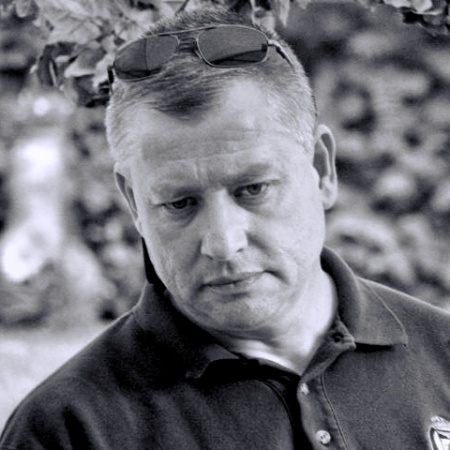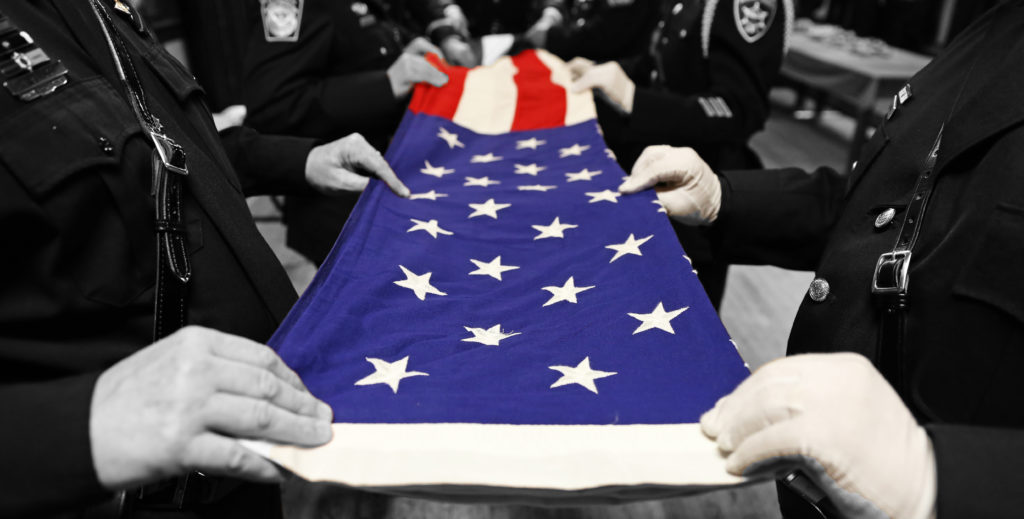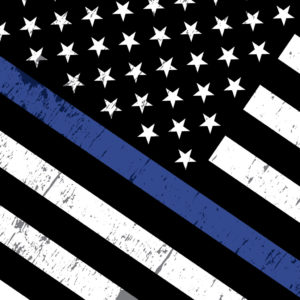On Vulnerability: Police Week 2019
This Police Week 2019 piece is authored by Hank Kula, a retired police sergeant with over 26 years of experience working in law enforcement.
Justice comes from furrowed brows.
Two reasons police officers frown: hold back emotion; try to do a job perfectly in an imperfect world.
We expect and demand that from cops. As a result, we’re killing them, and they’re killing themselves.
As we enter National Police Week 2019, the data:
- In 2018, we lost 163 police officers.
- So far in 2019, we’ve lost 41 cops.
- In 2018, we lost 165 police officers to suicide; so far this year – 72.
- We lose countless retired police officers to suicide every year.
(Disturbingly, as I write, I have to keep raising the number of officers lost.)
We expect everyone to be human, except police officers. We expect them to be superhuman – don’t feel, don’t kill people trying to kill you, don’t make a mistake. Make sure you protect us, but don’t worry about yourselves. We’re unforgiving of police, but when we’re in the wrong, we expect them to look the other way; if they don’t, they’re harassing us.
Another manhunt for a cop killer, last week in Biloxi, MS. Ironic, a week before National Police Week 2019. As a former cop, I realize we’re hell bent on our own destruction. Drip or by drop. A thousand small cuts or one gaping wound, as a society, as a country, as a culture, we are bleeding to death. We kill the very people who protect us; we don’t support them. No one thinks cops are never wrong, don’t do bad things, or don’t cause harm out of hurt, anger, frustration, or discrimination. Police officers are human, NOT superhuman. Time we started treat them as such.
Demanding that cops be superheroes sets the same trap they often set for themselves – perfection and intolerance of failure. When police fail, they experience the same disdain, disappointment, fear, and shame. Unlike most, in paramilitary “cop culture” they are disciplined and punished, they lose days off, income, reputation, career, and family. Sometimes they lose their lives. At their own hands.
We lose as many cops to their own demons as we do to the streets. We lose retired law enforcement to suicide as well. To civilians and police – our culture, AND our “cop culture” must change, for we own both.
Today’s culture
We’ve regressed into a less civilized society of extremes. None of us is completely clean in this, not even those who profess equality. Many choose zeal over substance – accusation without proof, conviction without trial, lawsuit without cause, and when all else fails, discrimination without any evidence.
We are a sports culture – poor sports. We’re rude, inappropriate, belittle people and rejoice in others’ misfortunes. We shout over each other, don’t listen, learn, or even try to understand. It’s no longer okay to hold different opinions or disagree. We lost a willingness and ability to compromise – a precept upon which our country was founded. We don’t evolve, we revolve. ‘Round and round’ we demand justice, choose fiction over fact, and distort reality because loud lies drown out simple truths. If fiction fits our beliefs at the moment then it must be true.
Blame society, history, social media, individuals, politics, the media – truth is, we need to look at ourselves. You support social issues and people in need, but don’t stand up for the very people who stand up for you every day? Law enforcement starves for some of those energetic words you post on social media. Humans in uniform keep evil at bay, help people in need, protect and save lives. They willingly take on the split-second decisions of life and death; their only expected return is society grant a thin veneer of latitude when they make those decisions.
Instead, we see unrealistic, dangerous, legislative initiatives like California’s AB-931 use of force bill which forces officers to second guess and endanger themselves. Such proposals aren’t just dangerous to cops on the street, they affect police response. Out of survival, some officers admit they hesitate; lack of support now translates into attacks upon cops. More likely healthy tactics than reluctance, hesitancy under fire is human nature – vulnerability of professionals dedicated to a cause greater than themselves – community. Misguided community initiatives ignore activist-inspired tolerance of bad behaviors – lawlessness, open disregard for authority, disrespect, disorder – resulting in victimization of innocents.
It’s popular to demand government bring police to heel and establish civilian-based review and disciplinary boards. When established upon lack of trust instead of community support, such boards can embed a subculture of people who don’t want to understand or even believe in law enforcement. They fail to see that without police, society falls apart. They don’t want to cultivate an environment of support. Trust goes both ways. In communities where specters of civilian boards loom, good police officers go elsewhere. As a police instructor, I hear it from recruits and veterans alike.
Cop culture
Cops don’t push back on society when pushed upon. You’re not allowed to. When you became a cop, you lost your right to free speech. You fall in line with administration because you are government’s representative. Rules, regulations, general orders, politics, and management keep you in line. There isn’t a lot of flexibility in police administration; some self-imposed, much required by the job, the rest demanded by society. There are ramifications for speaking up, even behind closed doors. No, it isn’t always fair.
As a cop you exist in a world where “force” ranges from simply showing up and having command presence to the split-second choice of deadly physical force. Force is reactionary, expected to be appropriate, and only a counterweight. In the court of public opinion, you have no sway. The only counterweight you have is family, friends, (a union if you’re lucky) and a minority of community members who have the courage to show up, stand up, and speak up in the face of anti-police vitriol.
Is it any wonder police officers keep to themselves? An “us against them” mentality develops naturally as a result of the nature of the job. It’s instinctive. Officers clam up, insulate from community as a group, and unfortunately, sometimes isolate as individuals from community, friends, colleagues, and even family. Alarmingly, the very people who encourage everyone else to seek mental health intervention, don’t take their own advice, they take their lives.
Cops as victims isn’t a popular view. You as a police officer are blind to it. Even in our limited cop culture of support, many police officers are afraid to seek it because needing help is perceived as weak. Asking for help requires vulnerability. Peer counselors, post-incident debriefs, and employee assistance programs show promise, but the few Neanderthals who reject the notion of mental health for police stymy progress for the rest.
Fear of judgement, questions of fitness for duty, labeling as a head case, and confidentiality are real concerns. If you can’t trust your own colleagues and agency to support you, how can you have faith outside?
Rejecting the premise you might need help as a cop isn’t foreign to you. A traumatic incident, a difficult case, the close call, the unparalleled fight with your spouse – you know what’s good for you – talking. That requires vulnerability – something few are good at. Vulnerability on the part of both community AND cops means talking, dialogue, and trust.
The police profession has slowly come around to recognizing key to effective policing is vulnerability – putting the department “out there.” Agencies that connect with community discover pockets of support can grow into collectives of resources. In return, a community vulnerable enough to openly support police discovers transparency. Such efforts aren’t without challenge. Can cops be vulnerable enough to accept scrutiny? Is the community ready to understand the realities of a police officer’s world? Will people accept facts instead of falsehoods propagated for a social agenda? Can cop culture continue its growing transparency, particularly when one of its own is wrong? Populations and police departments vulnerable enough to have effective conversations about policing are communities of support critical to reducing law enforcement fatalities.
You know you have support at home, but out in the community, you’re not so sure. Let’s change that.
Mission Critical: Police suicide
If you’re an active or a retired cop struggling, or know one, check out these links:
https://www.kimcolegrove.com/pausefirst/
Our cop culture requires a certain amount of emotional distance. Work / life balance is the challenge. We all know colleagues who have difficulty handling the stressors of police work or its aftermath in retirement. We can push them in the right direction, but THEY have to make the choice to do something. I wouldn’t write about vulnerability without a buy-in, so let me put myself out there.
I retired from law enforcement in October of 2017. I found work in the private sector and continue to instruct police recruits and veterans. Retirement was quick to reveal damage at home – destruction I was too blind to see as a cop. Marriage is tough; marriage to a cop is rough. Ongoing counseling gives us a better relationship – one I derailed selfishly, in part, by choosing work over home. Luckily, I have a patient, supportive partner who is smart and emotionally in touch. Here’s the vulnerable part – to say I didn’t have any dark moments wouldn’t be honest. One path I’m on …
There’s this no-bullshit author named Brené Brown who burst on the leadership scene in 2014 with a TedX talk on “The power of vulnerability.” “Researcher, storyteller, and Texan,” Brown navigated therapy in her own quest. She speaks our language. Both CEOs and Special Forces seek her counsel. “The bottom line: I believe that you have to walk through vulnerability to get to courage, therefore . . . embrace the suck. I try to be grateful every day and my motto right now is ‘Courage over comfort,’” she says.
I hope you find the courage you rely upon on the street is the same required to “Dare greatly.”
Authored By:
Hank Kula


